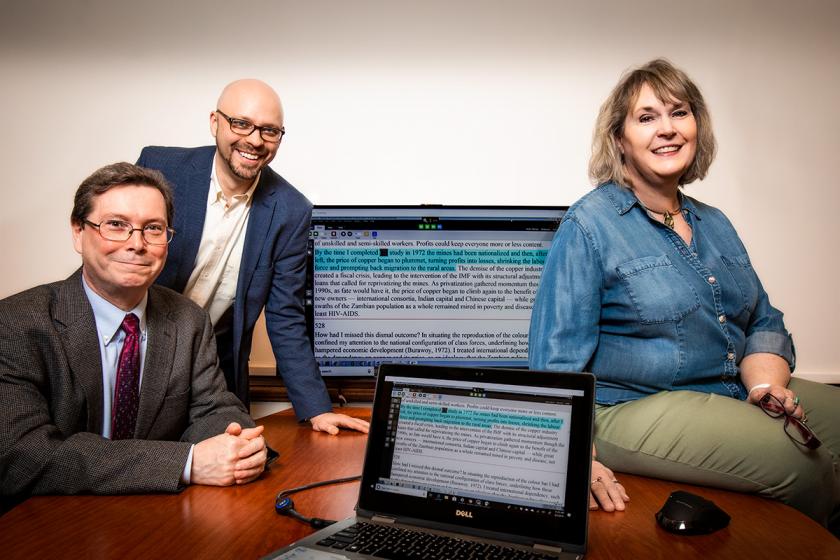The University of Illinois is working with six other universities to streamline and improve access to books for students with disabilities who need an alternative to the print format.
Part of a two-year effort funded by a $1 million grant from the Andrew W. Mellon Foundation, the project includes university libraries, disability resources offices and university presses, as well as the digital repositories HathiTrust, Internet Archive and Bookshare. John Unsworth, the university librarian at the University of Virginia and a former dean of the iSchool at Illinois, leads the initiative.
The grant project aims to eliminate duplication of effort and establish standards for accessibility for the digitized texts. It will establish a network of repositories for the digitized material and a system–EMMA, or Educational Materials Made Accessible–to hold records of the available material and allow users to search for particular books.
"If someone has remediated 'Moby Dick' for a student with print disabilities on one campus, no one should have to do that work a second time for a person with the same disability," Unsworth said. "Success in this project will lead to better service for students, faculty and staff who need accessible materials. If we share, we can deliver materials more quickly and focus our collective efforts on texts that have not been remediated."
Kyle Rimkus (MS '05), a preservation librarian at Illinois, supervises digitization work at the Main Library, which has digitized about 700,000 books in its collection. He is part of the grant project at Illinois.
"We'll help inform decisions made about the way content is packaged and delivered to patrons. We'll really be on the front lines of this project that will be in use by many, many other universities," he said.
J. Stephen Downie, an information sciences professor and the Illinois co-director of the HathiTrust Research Center, took part in a multi-university pilot project on the issue that led to the Mellon-funded EMMA project. It's estimated that about 10 percent of university students have some sort of disability, and that the number is increasing.
Downie and the other pilot project researchers analyzed the factors contributing to the problem of providing accessible materials. They concluded the methods of providing accessible materials are insufficient and inadequate.
"The libraries and the disability offices weren't always working together. The apparent lack of coordination created many one-off efforts, and the remediated documents were not being reused," Downie said.
"Providing materials for education and research is the core mission of an academic library, and that mission isn't limited to those who can read without assistance," Unsworth said.
The U. of I.'s Division of Disability Resources and Educational Services last year converted nearly 140,000 pages of print material into a digital format so students with disabilities such as vision impairment or a visual or learning disability could use a text reader to access books and other print materials. Many more students are requesting text conversion than in the past, said Angella Anderson, who oversees the text-conversion work in Accessible Media Services at DRES and also is part of the EMMA project team at Illinois. Nearly 50 students requested text conversion for the fall 2018 semester, including six doctoral students with heavy reading loads.

The work is time-consuming and labor-intensive, requiring workers to review the text line-by-line to correct mistakes made by the character-recognition software. Workers must also convert tables, charts, graphs and marginalia in a way that makes sense. Math and chemistry textbooks and music are particularly challenging, Anderson said. Meanwhile, disability services offices at other universities may be doing the same work with the same textbooks.
"We've got all these converted books sitting on a drive and they are not available to other universities unless someone specifically requests it from us," Anderson said.
Downie said one of the impediments to universities sharing the accessible materials they've created is fear of violating copyright protections. "Many professionals in our study expressed a fear of sharing because they don’t want to get in trouble," he said.
However, universities are able to make accessible copies of printed materials for use by students with disabilities without violating copyright laws under the doctrine of fair use.
Anderson said repositories for digital texts that conform to universal accessibility standards "would immensely change the landscape of accessibility for all users with print disabilities."
She said the accessibility standards must include preserving the heading structure and other formatting features with hyperlinks so a user can immediately go to a particular chapter; displaying page numbers so students can easily make citations; and providing a text description of graphics.
"It's not just making the text pristine," Rimkus said. "It's also representing the book as an object and making it intelligible and usable to someone who can’t see it."
The project staff will begin testing the technical tools this summer.
